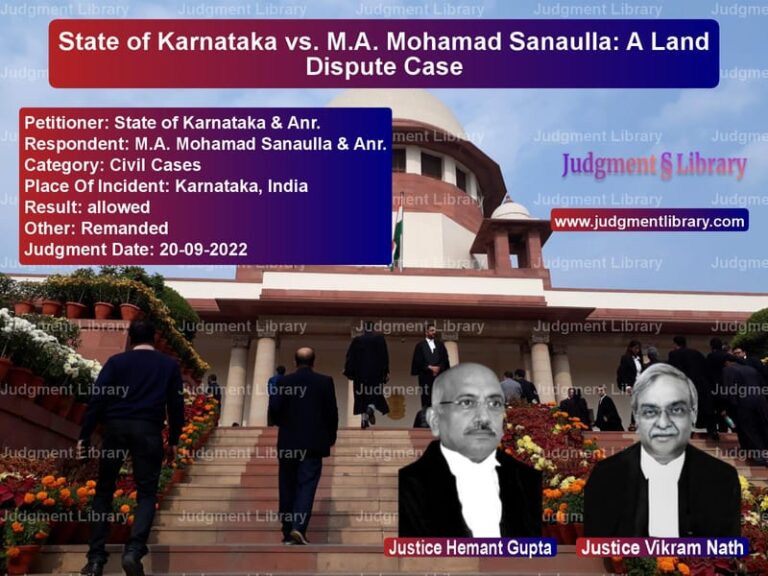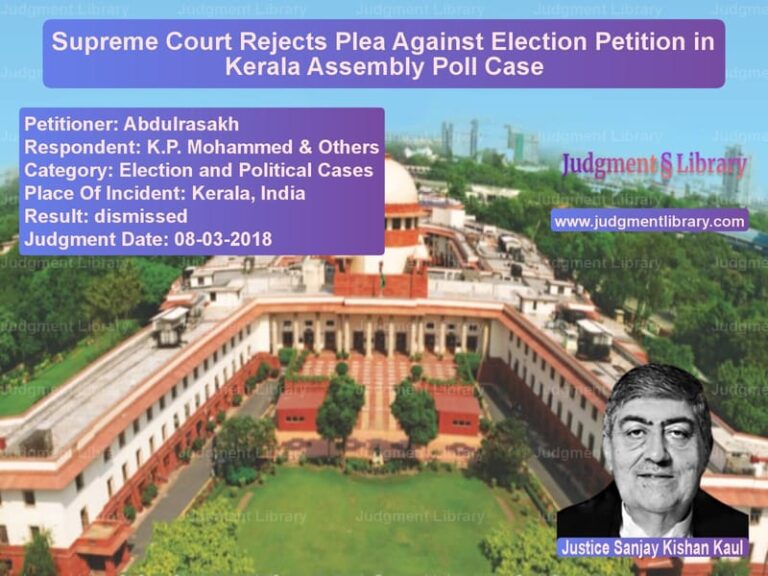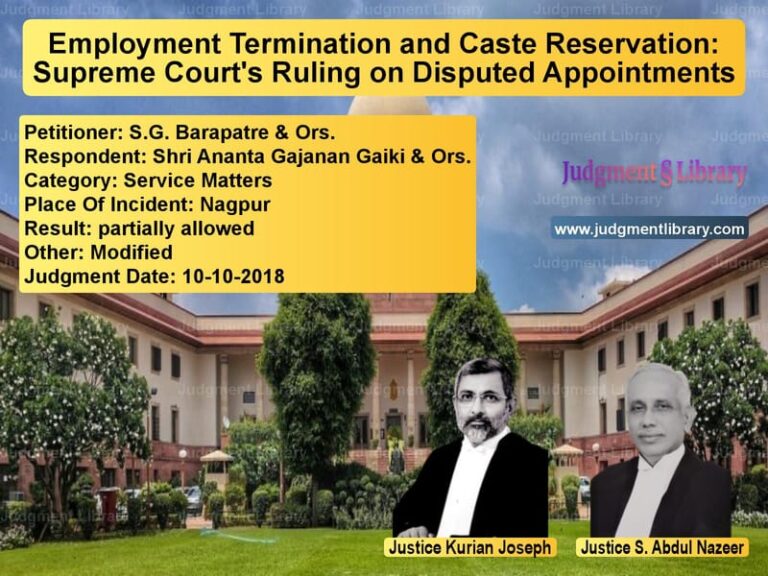Supreme Court Rejects Loop Telecom’s Claim for Refund of 2G Spectrum Entry Fee
The Supreme Court of India recently delivered a significant ruling in the case of Loop Telecom and Trading Limited vs. Union of India & Others, where the appellant sought a refund of the Entry Fee paid for acquiring Unified Access Service Licenses (UASLs) for 2G spectrum. The dispute revolved around whether a company whose licenses were quashed due to the government’s faulty allocation process could claim restitution under the Indian Contract Act, 1872. The Supreme Court upheld the decision of the Telecom Disputes Settlement and Appellate Tribunal (TDSAT) and dismissed the refund claims.
This case is significant as it sets a precedent regarding the legal consequences of governmental decisions declared unconstitutional and their impact on businesses that benefited from such decisions.
Background of the Case
Loop Telecom and Trading Limited (the appellant) applied for UASLs in September 2007 and was granted 21 licenses in 2008 after making an Entry Fee payment of Rs 1454.94 crores. However, the Supreme Court in Centre for Public Interest Litigation v. Union of India (2012) quashed all 122 2G licenses granted on or after January 10, 2008, due to the government’s illegal first-come, first-served policy.
Following the Supreme Court’s 2012 ruling, Loop Telecom filed claims before the TDSAT, arguing that since the licenses were quashed due to an illegal policy and not because of any wrongdoing on its part, it was entitled to a refund. The TDSAT dismissed the claims, prompting the appellant to escalate the matter to the Supreme Court.
Legal Issues Considered
- Whether the appellant was entitled to a refund of the Entry Fee paid for the canceled spectrum licenses.
- Whether Section 56 (frustration of contract) and Section 65 (obligation of restitution) of the Indian Contract Act, 1872 were applicable.
- Whether the appellant could claim restitution when it had benefited from an unconstitutional allocation process.
- Whether the government’s decision to allow set-offs for some licensees who participated in subsequent auctions implied an entitlement to a refund.
Petitioner’s Arguments (Loop Telecom)
- The appellant argued that since the licenses were canceled due to the government’s illegal allocation process rather than any fault on its part, it should be entitled to restitution under Section 65 of the Indian Contract Act.
- The cancellation of licenses amounted to frustration of contract under Section 56, and therefore, the government was bound to refund the Entry Fee.
- The government’s decision to allow some companies to set off their Entry Fee against payments in subsequent auctions implied that other licensees should also be entitled to refunds.
- The appellant had been acquitted of all criminal charges related to the 2G scam, removing any legal impediment to its claim.
Respondent’s Arguments (Union of India)
- The government argued that the Entry Fee was non-refundable as per the terms of the UASL agreement.
- The Supreme Court had quashed the licenses due to an unconstitutional policy, and the companies that benefited from this flawed process could not later claim restitution.
- Loop Telecom was in pari delicto (equal fault) because it had obtained the licenses through the same defective process as other disqualified companies.
- The set-off policy applied only to companies that participated in subsequent auctions and was not a basis for claiming direct refunds.
Supreme Court’s Judgment
The Supreme Court bench, comprising Justices Dhananjaya Y Chandrachud, Surya Kant, and Vikram Nath, ruled against Loop Telecom and upheld the decision of the TDSAT.
1. Restitution Not Available to Parties in Pari Delicto
“A party that has derived benefits from an illegal or unconstitutional transaction cannot seek restitution when that transaction is annulled.”
The Court held that Loop Telecom had acquired its licenses through an unconstitutional policy and could not claim a refund.
2. Non-Refundability of Entry Fee
“The Entry Fee was a condition of the license agreement, and there was no provision for its refund upon cancellation.”
The Court ruled that the contractual terms clearly stated that the Entry Fee was non-refundable.
3. Section 56 (Frustration of Contract) Not Applicable
“The doctrine of frustration applies to contracts that become impossible to perform, not to cases where a contract is voided due to illegalities in governmental action.”
The Court held that the frustration doctrine was not applicable since the contract itself was invalidated due to illegality.
4. Government’s Set-Off Policy Does Not Create Refund Entitlement
“The policy allowing set-offs for certain companies participating in auctions was a discretionary measure and does not establish a legal right to refunds.”
The Court ruled that Loop Telecom could not claim a refund based on policies applied to other companies.
Key Takeaways from the Judgment
- Companies that benefited from unconstitutional government actions cannot claim restitution when those actions are overturned.
- The Entry Fee for UASLs is non-refundable unless explicitly stated otherwise.
- The frustration of contract doctrine under Section 56 does not apply to transactions nullified due to government illegality.
- Government policies allowing set-offs in subsequent auctions do not create a general entitlement to refunds.
Implications of the Verdict
This ruling has significant implications for corporate law and public resource allocation:
- Companies must exercise due diligence when participating in government auctions.
- Public resource allocations declared unconstitutional will not entitle beneficiaries to automatic refunds.
- The decision reinforces the finality of contractual terms regarding non-refundable payments.
Overall, this Supreme Court ruling ensures that companies cannot seek financial restitution when they have benefited from an unconstitutional governmental action.
Petitioner Name: Loop Telecom and Trading Limited.Respondent Name: Union of India and Anr..Judgment By: Justice Dhananjaya Y Chandrachud, Justice Surya Kant, Justice Vikram Nath.Place Of Incident: India.Judgment Date: 02-03-2022.
Don’t miss out on the full details! Download the complete judgment in PDF format below and gain valuable insights instantly!
Download Judgment: loop-telecom-and-tra-vs-union-of-india-and-a-supreme-court-of-india-judgment-dated-02-03-2022.pdf
Directly Download Judgment: Directly download this Judgment
See all petitions in Company Law
See all petitions in Corporate Compliance
See all petitions in unfair trade practices
See all petitions in Bankruptcy and Insolvency
See all petitions in Mergers and Acquisitions
See all petitions in Judgment by Dhananjaya Y Chandrachud
See all petitions in Judgment by Surya Kant
See all petitions in Judgment by Vikram Nath
See all petitions in dismissed
See all petitions in supreme court of India judgments March 2022
See all petitions in 2022 judgments
See all posts in Corporate and Commercial Cases Category
See all allowed petitions in Corporate and Commercial Cases Category
See all Dismissed petitions in Corporate and Commercial Cases Category
See all partially allowed petitions in Corporate and Commercial Cases Category







